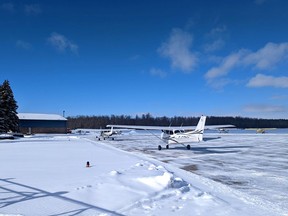Consultants with HM Aero Aviation Consulting have recommended that the City of Stratford maintain ownership of its airport and continue offering it as a municipal service despite its annual tax-supported operating deficit.

Consultants hired by the city last year to complete an airport feasibility study are recommending Stratford keep the facility as a municipal service despite its money-losing status.
HM Aero aviation planning consultant Ben Crooks told councilors the city’s municipal airport places Stratford in a unique position in the region, and suggested there are a few untapped opportunities for additional revenue to offset what’s become an annual deficit. After considering different approaches, including selling the airport to private interests, the consultants recommended a “sort of status quo” but with more involvement from the city.
“The recommendation we made is for the city to continue to be involved in the ownership and the provision of the airport as a municipal service. That was made on the basis of, while we realize the airport is not financially self-sustaining and is unlikely to do so across the 10-year horizon, we do see the value provided by social and economic benefits and it aligns more broadly with the municipality’s strategic priorities,” Crooks said at council’s Monday meeting.
The airport’s social benefits, he noted, include its use by Ornge Air Ambulance to quickly transfer patients to and from hospitals in both Stratford and the wider region, as well as its potential to host search-and-rescue operations in the area or help with law enforcement investigations. Crooks also said the airport helped support youth aviation education through school tours, co-op placements and the Royal Canadian Air Cadets.
As for its economic benefits, the consultant said the airport provides inter-community access for private and charter aircrafts for tourists and business passengers while its existence can also be a factor for businesses and industries potentially setting up shop in the Stratford area. The Stratford airport, Crooks added, can also serve as a destination for aviation career training for pilots, aircraft maintenance engineers and related professions.
“You have, based at your airport, a Transport Canada certified flight-training unit that brings folks all the way from recreational training up to commercial training,” said Crooks, later noting that flight training accounts for 80 per cent of flights in and out of the Stratford airport.
If council opts to follow HM Aero’s recommendation to keep the airport, Crooks said there are ways to bring in more revenue to mitigate the annual deficit, including the development of its lands for private and commercial hangars, increasing airport fees and expanding the airport’s role in flight training. Additionally, the city could increase the rent in its current lease agreement with a local farmer who grows crops on a portion of airport land.
Crooks also recommended the city update its airport development plan to identify nearby lands for future growth while pursuing new partnerships for business development and marketing purposes that could push business to the facility. He also suggested that airport officials work with Stratford’s climate change program manager to develop strategies to reduce greenhouse gas emissions there. Finally, Crooks said the city should better publicize the airport’s social and economic benefits to the wider Stratford-area community.
While councilors didn’t commit to any of the suggestions, they voted to receive the study as information while staff prepares a report outlining the consultant recommendations for future consideration.
In 2023, Stratford’s airport is projected to collect revenues of nearly $397,000 from user fees, its agricultural cropping agreements, sales, rentals, leases and other income. The airport’s expenses, including a $100,000 transfer to reserves for future capital projects, are estimated to be a little more than $564,000, which leaves city taxpayers to cover a more than $167,000 operating deficit.
As a result of increasing costs and inflation, as well as what the consultants from HM Aero Aviation Consulting Inc. said will be necessary increases to the city’s annual transfers to capital reserves, that tax-supported deficit could jump to nearly $224,500 next year and then fluctuate between $218,500 and $296,000 over the next decade.

Comments
Postmedia is committed to maintaining a lively but civil forum for discussion and encourages all readers to share their views on our articles. Comments may take up to an hour for moderation before appearing on the site. We ask you to keep your comments relevant and respectful. We have enabled email notifications—you will now receive an email if you receive a reply to your comment, there is an update to a comment thread you follow or if a user you follow comments. Visit our Community Guidelines for more information and details on how to adjust your email settings.
Join the Conversation